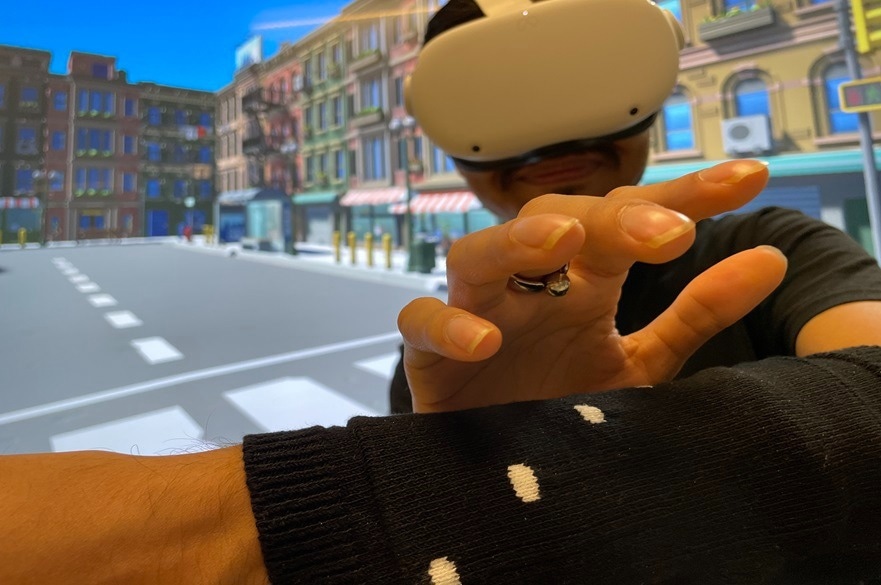A research team from Nottingham Trent University, Helmholtz-Zentrum Dresden-Rossendorf (Germany), and Free University of Bozen-Bolzano (Italy) has developed washable, durable electronic textiles capable of sensing magnetic fields—believed to be the first of their kind. This breakthrough opens new possibilities for integrating smart functionality into everyday clothing.

The textile can be operated by the user through the use of a ring or glove. Image Credit: Free University of Bozen-Bolzano
In a study published in Communications Engineering, a Nature Portfolio journal, the researchers detail how tiny, flexible, and highly responsive magnetoresistive sensors can be embedded into braided textile yarns. These yarns are compatible with standard textile manufacturing, making large-scale production feasible.
When paired with a ring or glove containing a small magnet, the fabric can interact with users in various ways. Integrated seamlessly into the textile, the sensors can be highlighted using dye or embroidery, functioning as touchless controls or "buttons."
This technology could even take the form of a textile-based keyboard and is designed to work underwater and in different weather conditions. Unlike some capacitive textile sensors, which can activate accidentally when brushed against surfaces, these magnetoresistive sensors require intentional interaction, making them more reliable.
By embedding this technology into everyday clothing, users could control smartphones, smartwatches, and other digital devices simply by interacting with their garments—effectively turning clothing into a wearable human-computer interface.
Potential applications range from temperature or safety controls in specialized clothing to gaming and interactive fashion. For instance, users could trigger LEDs or other illuminated textile elements with simple gestures.
The research team demonstrated several practical uses for the technology, including a functional armband that enables navigation in a virtual reality environment and a self-monitoring safety strap for motorcycle helmets.
This is believed to be the first time washable magnetic sensors have been seamlessly integrated into textiles for human-computer interaction.
Our design could revolutionize electronic textiles for both specialized and everyday clothing.
Dr. Pasindu Lugoda, Lead Researcher, Department of Engineering, Nottingham Trent University
Lugoda continued: “Tactile sensors on textiles vary in usefulness as accidental activation occurs when they rub or brush against surfaces. Touchless interaction reduces wear and tear. Importantly, our technology is designed for everyday use. It is machine washable and durable and does not impact the drape, or overall aesthetic appeal of the textile.”
Electronic textiles are becoming increasingly popular with wide-ranging uses, but the fusion of electronic functionality and textile fabrics can be very challenging. Electronic textiles have evolved and now rely on soft and flexible materials which are robust enough to endure washing and bending, but which are intuitive and reliable.
Dr. Theo Hughes-Riley, Study Corresponding Author, Advanced Textiles Research Group, Nottingham Trent University
Kalana Marasinghe, a Study Researcher at Nottingham Trent University, added: “Our design introduces a novel approach to interactive wearables, including applications in conventionally unlikely environments.”
Journal Reference:
Lugoda, P., et al. (2025) Submersible touchless interactivity in conformable textiles enabled by highly selective overbraided magnetoresistive sensors. Communications Engineering. doi.org/10.1038/s44172-025-00373-x